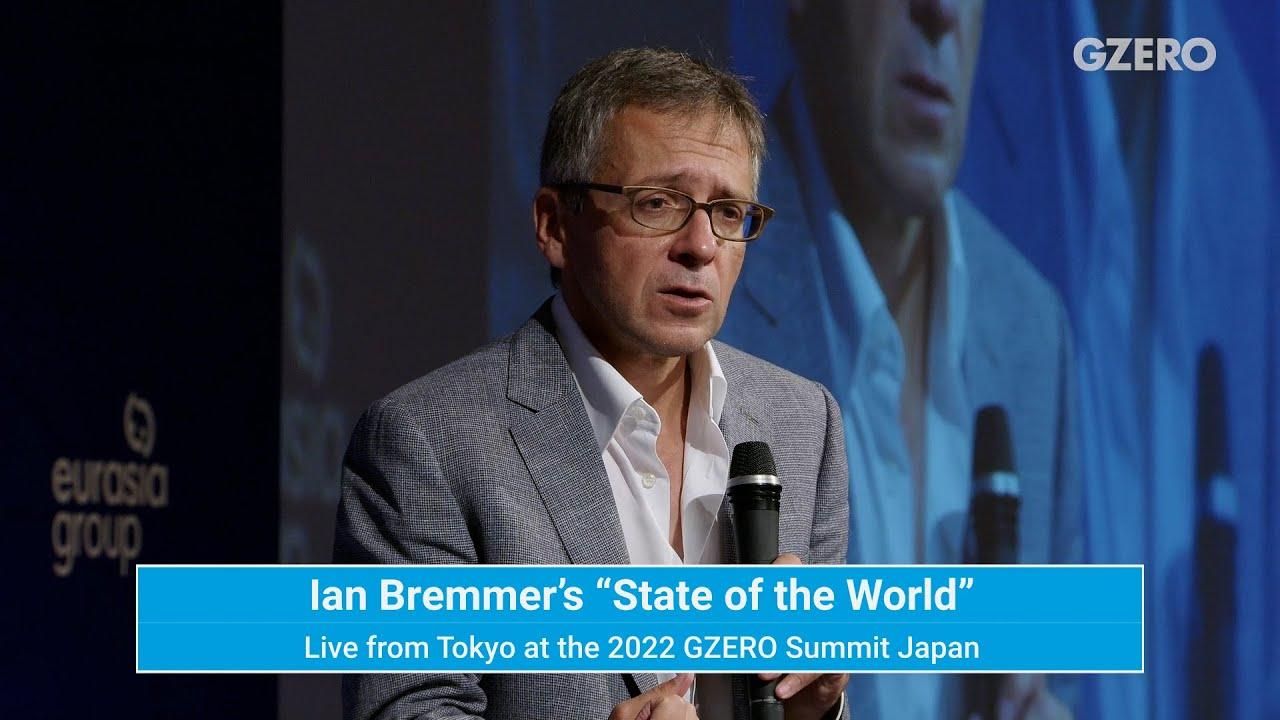State of the World
State of the World: On the verge of fragmentation?

Ian Bremmer: State of the World 2022 | GZERO Summit | GZERO Media

In Tokyo this morning, Eurasia Group and GZERO Media President Ian Bremmer kicked off this year’s GZERO Summit with his annual “State of the World” keynote speech. As usual, he gave his audience plenty to think about and debate.
He opened with a recap of the past year in international politics, focusing on Russia’s war in Ukraine and its international fallout. The big takeaway: Vladimir Putin has accomplished virtually the opposite of everything he intended. He has boosted Ukraine’s national pride and its determination to cut the ties that have long bound it to Russia. Instead of “demilitarizing” Ukraine, he has brought its soldiers the most modern and powerful weapons they’ve ever had. He united Europeans and Americans in opposition to his invasion. He has strengthened and expanded arch-nemesis NATO and inflicted decades-long damage on Russia’s economic strength, military capabilities, and political cohesion.
But it’s Bremmer’s vision of the future that will generate the most discussion. With a global system crippled by US domestic political dysfunction, intensifying US-China animosities, and growing tensions between the wealthy and developing worlds as fallout from COVID and the war widens gaps between global haves and have-nots, the global system itself is on the verge of fragmentation. Perhaps most startling of all, Bremmer argues that this might become a good news story.
The “global security order,” he argues, will remain American-led, and will be bolstered by both Russian aggression and rising anxiety in Asia over the expansion of China’s international influence.
The “global economic order,” Bremmer predicts, will depend mainly on China’s trajectory. If China becomes the world’s largest economy over the next 10 years and then extends its economic lead, Chinese investment abroad and international demand for access to the Chinese market, he says, “will ensure a more multilateral trade order, with America’s push for strategic competition tempered by the hedging of European and Asian allies and a Chinese alignment for most of the developing world.” But, if mounting debt, poor demographics, and other factors force China to turn inward, “dominant regional powers will become the most important players on trade.”
The “global climate order” has already become multipolar and multi-stakeholder in ways that should give us more resilient confidence in our future,” Bremmer argues. Europeans have “set the pace on rulemaking and model-setting for how a post-carbon world of governance and society can function,” he notes, but it’s China, India, and the developing world that will play the largest role in determining the level of carbon emissions in coming decades.
Finally, there is the “global digital order.” The world’s largest and most dynamic technology companies are nearly all headquartered in America and China, but it’s the tech companies themselves that wield “sovereignty and rule-making power in the virtual world … for commerce, for security, and even for civil society.” Perhaps these companies will align with their governments, setting conditions for a lasting tech Cold War. But, he says, “if the digital space itself becomes the most important arena of great power competition, and the power of governments erodes relative to the power of tech companies,” then these technology giants will become “the central players in 21st-century geopolitics.”
The United States, China, Europe, India, or the tech giants? Who do you believe will become tomorrow’s great powerbroker? Or are you placing your bets on chaos?
Tell us what you think.This article comes to you from the Signal newsletter team of GZERO Media. Sign up today.
People in support of former South Korean President Yoon Suk Yeol rally near Seoul Central District Court in Seoul on Feb. 19, 2026. The court sentenced him to life imprisonment the same day for leading an insurrection with his short-lived declaration of martial law in December 2024.
65: The age of former South Korean President Yoon Suk Yeol, who was sentenced to life in prison on Thursday after being found guilty of plotting an insurrection when he declared martial law in 2024.
In an era when geopolitics can feel overwhelming and remote, sometimes the best messengers are made of felt and foam.
The Hungarian election is off to the races, and nationalist Prime Minister Viktor Orbán is facing his most serious challenger in 16 years.
Does skepticism rule the day in politics? Public opinion data collected as part of the Munich Security Conference’s annual report found that large shares of respondents in G7 and several BRICS countries believed their governments’ policies would leave future generations worse off.